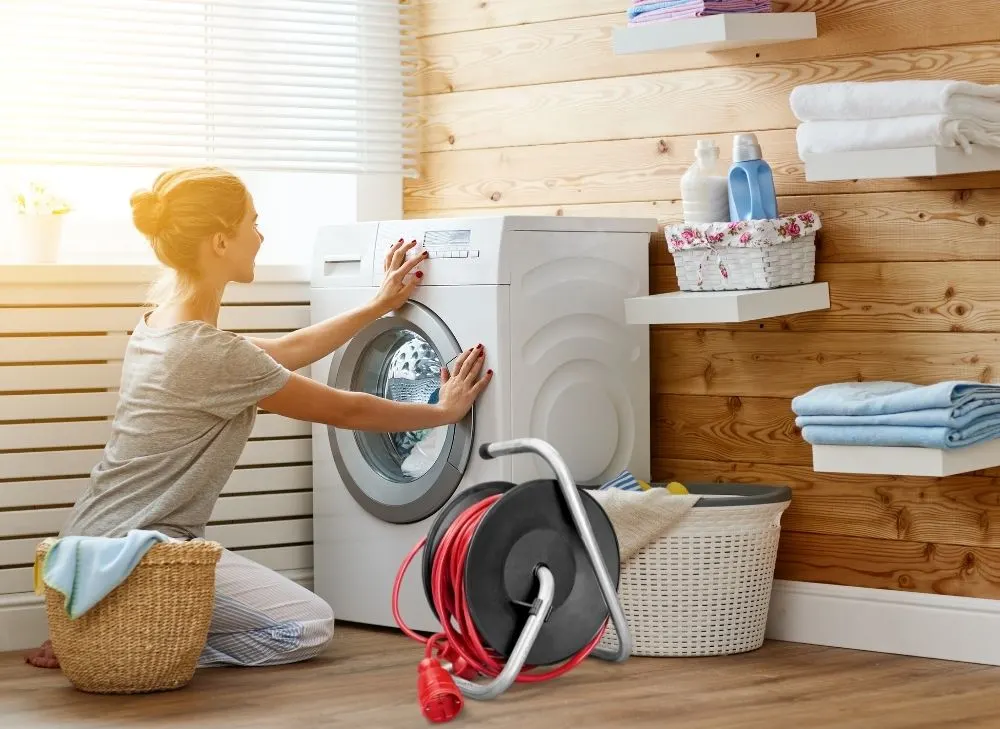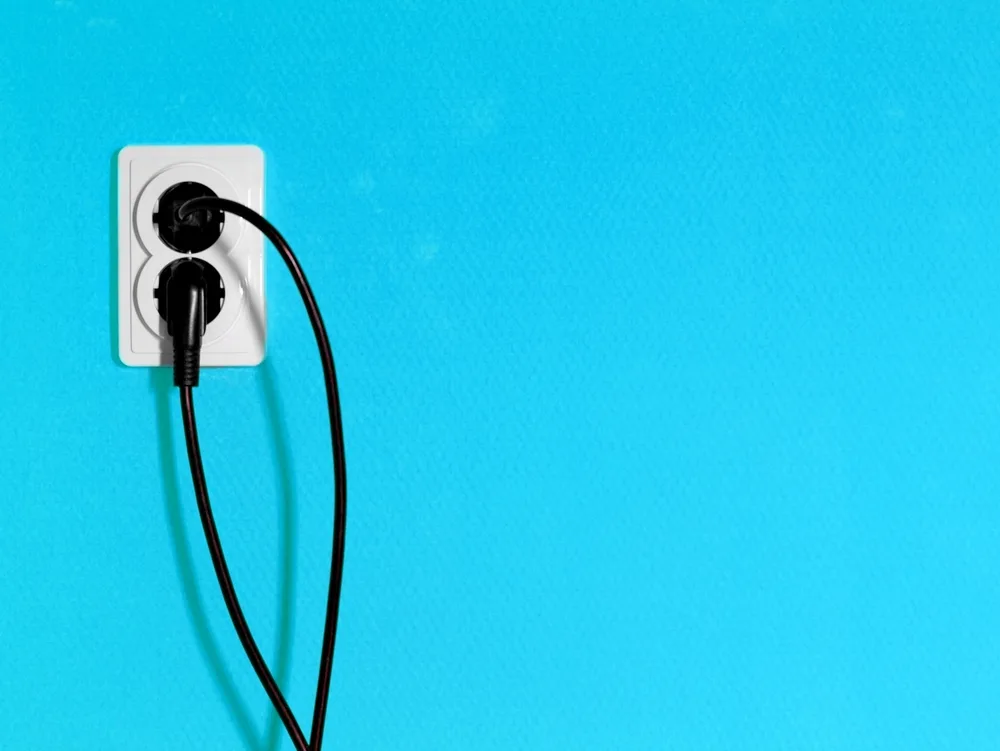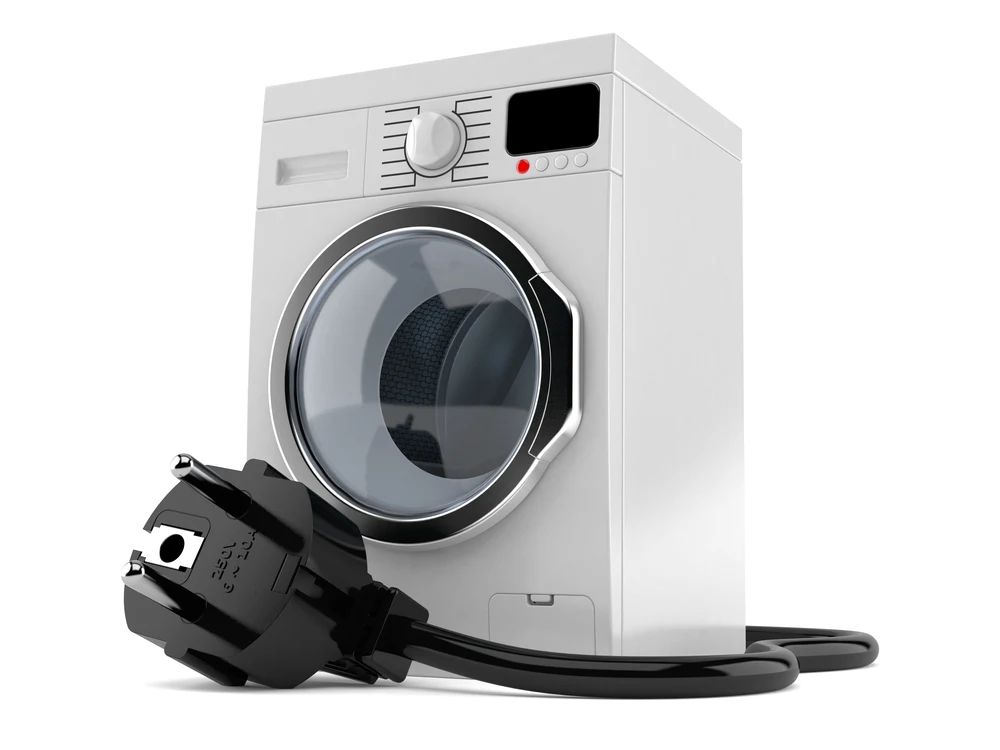Extension cords are versatile pieces of equipment and can be used for a wide range of applications. They come in handy in the house, garage, or workplace—but they are not always advisable when it comes to large appliances.
Using an extension cord on a washing machine comes with certain safety risks that you should know about before plugging in your machine. In this article, we will discuss those risks and offer some tips for choosing the right washing machine extension cord and how to do it safely.

In general, it should be fine to use an extension cord with a washing machine, but the user manual should always be consulted first. Washers with heaters should not be plugged into extension cords. The cables should match the amperage of the machine and the wires should be thick and short enough.
Can an Extension Lead Be Used With a Washer?
The general rule of thumb in the electrical industry is that extension cords are no-go zones for a lot of common appliances, including refrigerators and air conditioners, as well as heat-producing appliances, like microwaves and rice cookers.

It’s debatable whether washing machines should be connected to extension cords because they consume relatively little electricity. However, if your washing machine is fully automatic and thus has its own heater, it definitely shouldn’t be connected to an extension cord.
Before you run to the store to buy an extension cord for your washing machine, remember that it’s only true in general—specific models of washing machines can have higher amperage than other machines.
The fact that your washer is plugged into an extension cord also means there’s a lot more room for things to go horribly wrong (more on this later), and this is exactly the reason why manufacturers often explicitly recommend against it.
What Kind of Extension Cord for Washing Machine?
Amperage
Your washer’s power needs are indicated in your user manual. Use a wire rated for the amperage required by your machine. You can use one rated higher than your washer, but never choose one under the required amperage. A wire that is not rated for the load placed on it by your appliance may overheat and catch fire.
Plug Type
Although washing machine cords and extension cords are designed to fit together, you’ll have to make sure you have an extension with a female end that matches your machine’s cord.

Some larger and more powerful washing machines intentionally alter the prongs on their cords, preventing them from fitting into extension cords without modification.
Attempting to modify these cords yourself is incredibly dangerous; if you were thinking of doing that, it is a big no-no.
Wire Length
When using extension cords, it is important to remember that the longer the cord, the greater the resistance in the wire.
In order to ensure consistent current draw and avoid electrical problems, consider measuring according to your needs and having one custom-made at an electrical supply store. This means that you won’t have one that is too long for the distance.
A cord that is just the right length can be pulled and stretched in an unhealthy way, so ensure that you add a little to the measurements to ensure that it will rest nicely without pulling.
Wire Gauge
When searching for an extension cord, be sure that the gauge of your cord matches or exceeds that of your washing machine.
One (highly unscientific) way to determine this is to test the weight/diameter of the extension cord against that of the washing machine’s original cord.
Do not use a thin utility cord, typically orange or yellow, to power a large appliance such as a washing machine.
Tips for Using an Extension Lead With a Washer
While you can indeed plug your washing machine into an extension cord if there’s no other option (as long as the extension cord meets your machine’s requirements), you still need to be careful.

Here are some tips to avoid the dangers of using an extension with your appliance.
Placement
The laundry is more often than not a wet area. Exercise extreme caution when using an extension cord under these circumstances because water could seep into the socket, causing electrocution and serious injury, and in some circumstances, death.
If you can’t mount your extension cord on the wall, place it in an elevated, dry place away from any spill-prone area.
Power Limits
The rule I follow is to only have the washing machine plugged into the extension cord and nothing more.
The same goes for the outlet at the wall. If you draw too much power from a single outlet, you are at risk of overloading it—which, as you might imagine, can lead to a fire!
Overloading one outlet with too many high-powered appliances is not a good idea.
Ground it!
Always, always make sure to plug the extension cord all the way into a grounded wall outlet (more on how to identify this later). If you don’t, then problems with your outlet could cause sparks, arcing, and even electrical fires that could possibly set nearby walls or furniture and fixtures alight!
What Kind Of Outlet Does A Washer Need?
It takes a big outlet to run big appliances. Household washing machines, however, can be plugged into almost any outlet; they don’t need a 240-V line like tumble dryers (which are, therefore, dangerous to use with extension cables) because they don’t use much energy.
Most washing machines can be plugged into ordinary 120-volt household outlets, but be sure to read the instructions in the user manual of your new washing machine to make sure!
As we’ve discussed, also be sure you have connected the extension cord into a grounded outlet. Otherwise, you might get a nasty shock, and your house could catch on fire!
You’ll know you’ve found a grounded outlet once you spot its notorious three-slot layout. The left slot is for the “neutral” point, and it’s linked to the silver screw. The right slot is for the “hot point”, and it’s linked to the brass screw. The green one is for ground, and it should always be wired to green.
Sources
https://www.hunker.com/13410438/type-of-wire-gauge-to-use-for-an-electric-dryer
https://homeguides.sfgate.com/far-electricity-need-sink-83084.html
https://homex.com/ask/what-kind-of-outlet-does-a-washer-need
https://www.nidirect.gov.uk/articles/electrical-safety
https://www.myelectricworks.com/blog/2021/march/power-strip-dos-and-don-ts-what-is-and-isn-t-saf/
